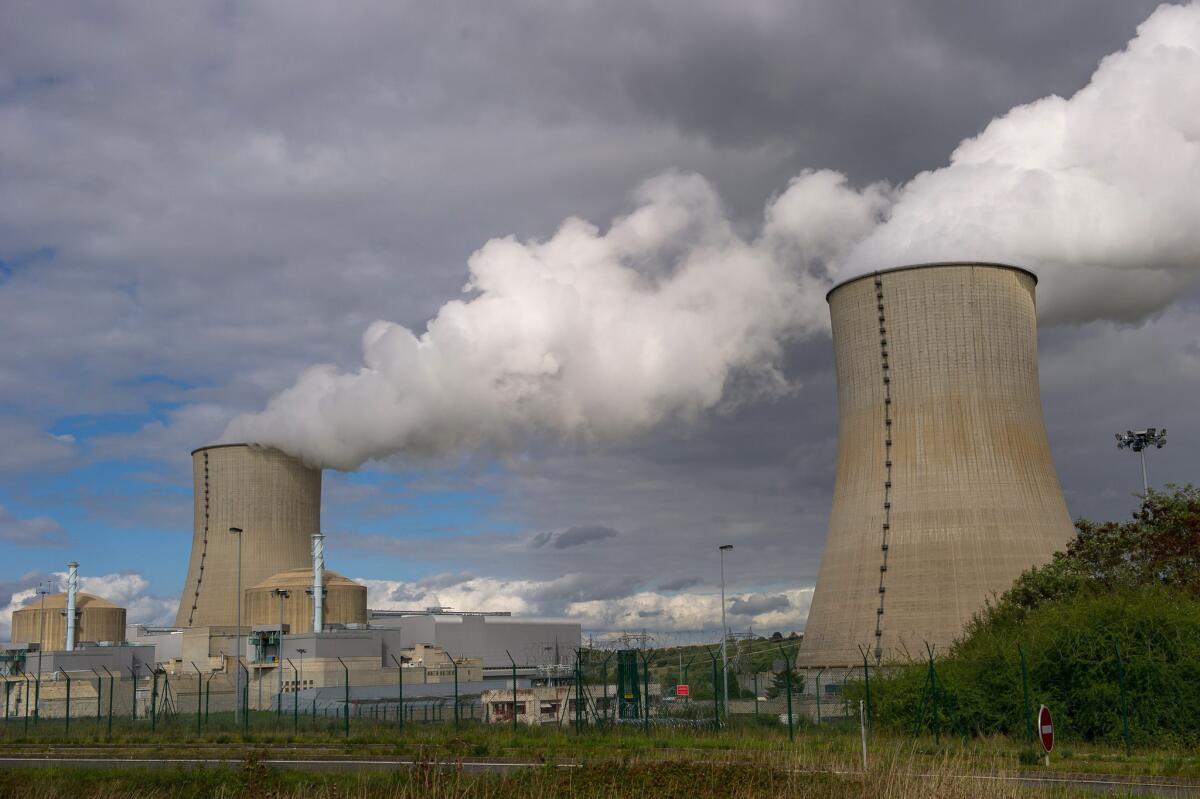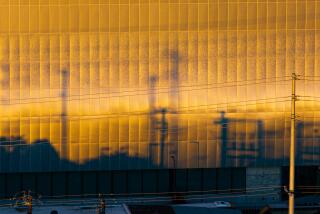California entrepreneurs push to reinvent the nuclear industry

A nuclear power plant at the edge of the Vienne River in western France.
Reporting from Mountain View, Calif. — The state that spawned a generation of activists committed to shutting down nuclear reactors and crippling the industry has lately become a hotbed of advocacy and financial support for fighting global warming with, of all things, nuclear power.
Encouraged by the Obama administration, notable California innovators and financiers are looking to reinvent the industry in the mold of wind and solar power. They are betting on prototype technologies that seek to replace the hulking plants of today with smaller, nimbler units. Environmentally minded nuclear engineers argue that they can be designed so safely that they might be “huggable.” They talk of power plants that consume nuclear waste instead of creating it.
State leaders aren’t necessarily rushing to embrace the vision in a place where all but one nuclear plant have been mothballed and where old-guard nuclear safety advocates warn that so-called advanced nuclear technologies are an attempt to put shiny earrings on the same old pig.
Gov. Jerry Brown is not expected to highlight his state’s nuclear renaissance at the United Nations climate summit in Paris, where the Democrat will tout California’s leadership in other zero-emission technologies.
But the investors and nuclear scientists opening start-up labs in the office parks of California’s technology hubs and within the research centers of universities see a more influential ally in the White House.
Nuclear power is at the nub of the Obama administration’s “all of the above” strategy for reinventing the energy industry in an era of climate change, and its faith in the fraught power source has captured the imagination of some notable and deep-pocketed West Coast thinkers.
Investors, including Microsoft founder Bill Gates and PayPal co-founder Peter Thiel, have poured about $2 billion into a few dozen small outfits, many of which are concentrated in the West. The entrepreneurs behind them are racing to design nuclear power facilities engineered to seem no more imposing than a neighborhood arts center.
“This is the place to be,” said Jacob DeWitte, chief executive of UPower, a start-up that recently migrated here from Cambridge, Mass., in its quest to create modular nuclear plants with reactors small enough to fit inside a shipping container and sturdier than “a brick outhouse.”
“In other places you would tell people you’ve got a nuclear start-up and they look at you like you are kind of nuts,” he said. “But here in Silicon Valley it is like, ‘That’s super cool. Can I help?’ There’s that ethos here.”
------------
FOR THE RECORD
12:12 p.m.: An earlier version of this story stated that the firm UPower’s proposed nuclear reactor would fit on the bed of a pickup truck. The reactor would be larger than that, but small enough to fit in a shipping container.
------------
DeWitte, 30, talks in terms that make some veterans of the decades-long struggle over nuclear power chafe, promising his firm will build units that could safely run on existing stockpiles of nuclear waste, all while being “meltdown-proof” and not using any material that terrorists could steal to turn into a weapon.
That may all be possible someday, say the nuclear experts at the Union of Concerned Scientists, but that day is probably several decades and many tens of billions of dollars away. The sudden excitement around nuclear makes them nervous. They say they have seen this before.
“The people who deny or downplay the risks involved are doing a disservice to the future of nuclear power that leads to complacency, and complacency leads to Fukushima,” said Edwin Lyman, a senior scientist at the organization. “This is very complex. It is hard. It costs a lot. It is slow, especially to develop advanced systems.… It seems nuclear will at most be a minor contribution over the next few decades to dealing with the climate crisis.”
That’s not the view inside the stylish, airy San Francisco offices of Thiel’s Founders Fund, where he and other venture capitalists, perhaps inspired by the views from the giant windows overlooking Presidio Park, make big bets on big ideas. Thiel made about $1 billion with an early $500,000 investment in Facebook. He got in on the ground floor with Yelp. He and his partners at PayPal, including Elon Musk, grew the online payment service from nothing to a firm that EBay paid $1.5 billion to acquire.
And lately Founders Fund is excited about zero-emission nuclear power as a solution to climate change. It has infused $3 million into Transatomic, a start-up in Cambridge launched by two graduates from MIT’s nuclear engineering program who have been pitching their vision in small networking meetings and, of course, TED Talks.
“I became a nuclear engineer because I am an environmentalist,” said Leslie Dewan, the 31-year-old co-founder of Transatomic. “This is what the world needs. The world needs a cheap source of carbon-free power that is even lower cost than coal if we want to avoid the devastation caused by fossil fuels.”
Her faith in nuclear energy is underscored by the fact that she launched her company only a week after the Fukushima nuclear plant disaster in Japan in 2011. The particular day also happened to be the 25th anniversary of the 1986 Chernobyl nuclear power plant disaster in Ukraine.
The faith is shared by Founders Fund partner Scott Nolan, who is among the few equipped to judge the mind-bending Transatomic blueprints on their merits. Nolan is a rocket scientist. Earlier in his career, he built propulsion systems at a firm that is perhaps even more audacious than Transatomic: Musk’s space exploration company, SpaceX.
“We believe they have the right technology, that it is going to eliminate a lot of the concerns that have existed around nuclear,” Nolan said. “We think it can work.”
He talks about the anxieties around nuclear power: the potential for radioactive release at a plant, the possibility terrorists will steal material to build a dirty bomb, the dangerous waste that won’t decompose for thousands of years, the immense costs.
Then he dissects each concern, explaining why Transatomic’s technology makes the issue obsolete. He talks about a plant that would run on existing nuclear waste and be “classified as walk-away safe. There is no way for it to go unstable.”
The Sierra Club says it has all the makings of a snake-oil sale.
“There is always such a rosy picture coming from the industry of what it can deliver with these technologies, yet it has such a terrible history with over-promising and under-delivering,” said John Coequyt, the Sierra Club’s director of international climate programs. The organization would prefer the Obama administration abandon the extremely costly pursuit of advanced nuclear power in favor of greater investment in renewable energy such as solar and wind power.
But that’s not the direction the White House is headed. It hosted a nuclear power summit last month during which John Holdren, the president’s senior advisor on science and technology, expressed hope of “making nuclear energy everything that it can be, and thus a major contributor in this country and worldwide to minimizing the risks from climate change.”
The administration announced its budget plan, including $900 million in new funding for development of advanced nuclear technologies, as well as plans to allow firms like UPower and Transatomic access to testing facilities in federally funded national research labs, which the firms had been lobbying for. This year, the House passed a resolution nudging regulators to nurture the industry.
Such moves have come at the urging of some muscular neoliberal think tanks in California and Washington, D.C.
The Breakthrough Institute in Oakland, where philanthropist Rachel Pritzker and Whole Earth Catalog founder Stewart Brand sit on the board, has been a major proponent of the technologies as a solution to climate change, most famously in the 2013 documentary “Pandora’s Promise,” which premiered at the Sundance Film Festival. Pritzker is also on the board of Third Way, an influential advocacy group best known for helping centrist Democrats find bipartisan approaches to policy disputes. The group, which receives some nuclear industry funding, is leading the push in Washington.
“We look at the climate challenges we face and the continued growth of energy in places like India and China, and we don’t see a choice,” said Josh Freed, vice president for clean energy at Third Way. “You have to do this.”
ALSO
California prisons chief says he will step down
State senator says juveniles need protection during police interrogations
The undertow in a new California poll: economic and political unease
More to Read
Get the L.A. Times Politics newsletter
Deeply reported insights into legislation, politics and policy from Sacramento, Washington and beyond. In your inbox three times per week.
You may occasionally receive promotional content from the Los Angeles Times.











